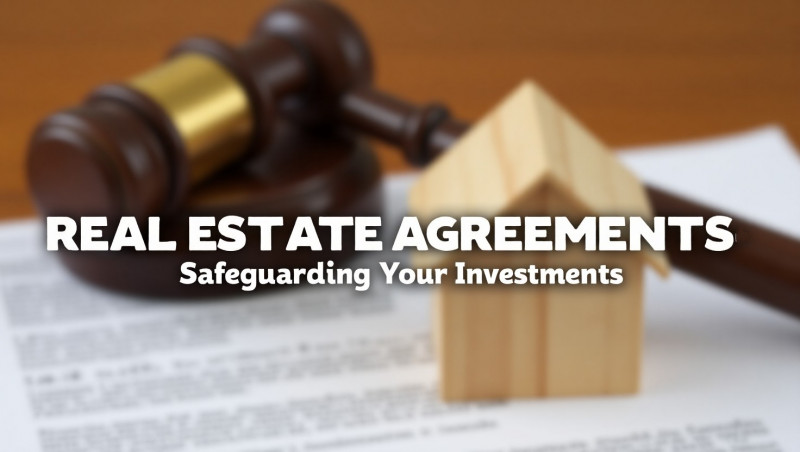- May 12, 2025
-
Real Estate Agreements: Safeguarding Your Investments
Buying or selling property? Great! But before exchanging keys or cash, let’s talk about the real backbone of any property deal—the legal paperwork.
From sale agreements to power of attorney documents, registering and documenting your property transactions is the best way to secure your rights and avoid ugly disputes later. Whether you're dealing with family land, inherited property, or multi-party ownership, here’s what you need to know.
Why a Proper Agreement Document is a Must
An agreement document isn’t just a formality—it’s a legally binding contract that defines:
- The terms of the deal
- Rights and responsibilities of each party
- Sale price, timeline, and payment schedule
- Legal remedies in case one party fails to follow through
✅ In real estate, an unregistered or vague agreement can be challenged in court or even declared void. Registering it under the Registration Act, 1908, gives it full legal power.
Minor, Guardian & Property Sale
If a minor (under 18 years old) is involved in a land deal—as a buyer or seller—things get more complicated.
Legal Requirements:
- A court-appointed guardian must act on the minor's behalf.
- The District Court’s permission is mandatory to sell or transfer a minor’s property.
- Without a court order, such a transaction may be declared null and void later.
⚠️ Don’t assume family consent is enough. Only a court-backed guardian can legally execute the sale or transfer involving a minor’s share.
POA, Court Orders & Unregistered Consent
A Power of Attorney (PoA) gives another person the authority to act on your behalf in property matters. But here’s the catch—it must be registered to be legally enforceable in most cases.
Types of PoA:
- General Power – Broad authority (e.g., managing all property matters)
- Special Power – Specific action (e.g., selling one piece of land)
Legal Best Practices:
- Register the power document at the Sub-Registrar’s Office.
- If it’s from a different state or country, get it adjudicated (recognized) in the local registration office.
- Include clear clauses for duration, scope, and revocation.
❌ An unregistered PoA, especially in a property sale, may be considered invalid—and the transaction may not hold up in court.
Property Power Scenarios & Legal Clarity
1. Should You Register a Consent Bond Among Heirs?
Yes! If multiple heirs or family members are involved in a property, registering a Consent Bond clarifies everyone’s role, avoids future disputes, and ensures a smooth transaction.
- Consent bonds are especially important in ancestral or joint family property sales.
- Even if verbally agreed, get everyone’s signature on a registered legal document.
2. Is Father’s Property Power Valid After 15 Years?
- Check the original document for any expiry clause.
- If it’s registered and doesn’t specify a duration, it may still be legally valid.
- But if it's unregistered or outdated, legal enforceability becomes questionable.
👩⚖️ Best bet? Consult a lawyer to confirm the current legal standing before using it in a transaction.
3. What If the Unregistered Power used in a Sale?
Example: Your grandmother’s land was sold using a power of attorney that was never registered.
- That sale might be legally challengeable, especially if ownership is now disputed.
- Ten years later, even if it’s been recorded, if the original wasn’t registered, it raises doubts over legitimacy.
- In such cases, you may need a legal declaration or court order to clear title.
4. Bond registration possible after a signatory's death?
This is tricky. If a person (e.g., an elder brother) signed the bond but died before registration, the bond’s legal standing is in question.
- Registration requires all living parties to consent at the time of execution.
You may now need:
- A legal heir certificate
- Fresh consent from successors
- Possibly a probate or succession certificate
5. How to Cancel a Power Bond or PoA?
Revoking power or canceling a registered bond isn’t automatic—you need to officially revoke it.
Here’s how:
- Draft a Revocation Deed.
- Get it notarized and registered (if the original PoA was registered).
- Send written notice to the agent and any concerned parties (like buyers, banks, etc.).
- Publish in a local newspaper if needed for wider public notice.
🔐 A revoked PoA without proper notice may still be used by the agent—which could legally bind you, so don’t skip this step!
📋 Buyer & Seller Legal Agreement Checklist
Final Thoughts: Protect Today, Prevent Tomorrow’s Disputes
In the real estate game, your most powerful tool isn’t money—it’s paperwork. A registered agreement today is what saves you from heartache, courtrooms, and property headaches tomorrow.
Remember:
- Don’t rely on oral promises or family handshakes.
- Ensure every authority document is registered and up to date.
- Get legal help if there’s a minor, multiple heirs, or past PoAs involved.
Make your investment bulletproof—not just beautiful on paper.


Comments :
Currently, there are no comments in this post. Be the first person to comment on this post.